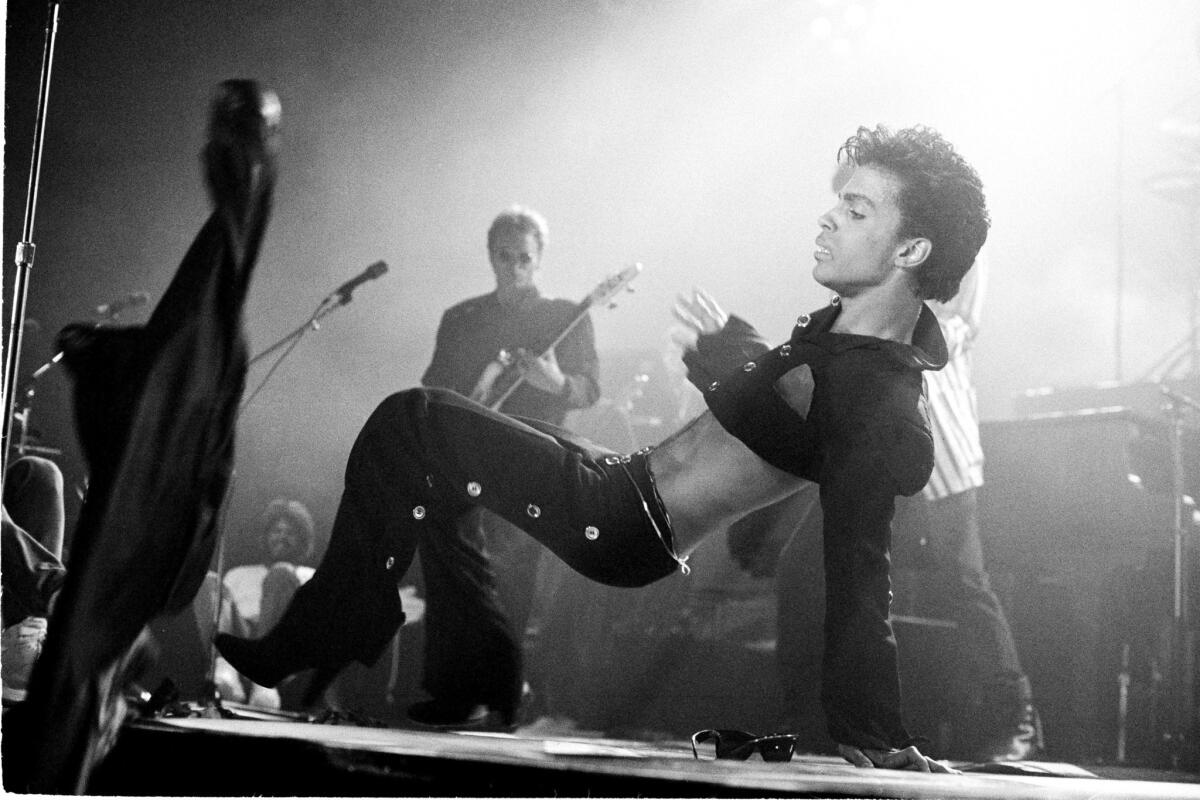When Prince bended gender, he gave black men permission to be free
- Share via
When Prince ascended the stage of the 1985 Academy Awards to accept the original score Oscar for “Purple Rain,” his body appeared to be draped in purple glitter. Atop a black pant suit, he wore a shining purple shawl that covered his head, shoulders and arms — and pulled the attention away from the high heels on his feet. His hands were tucked into a pair of black lace gloves, while at his side stood The Revolution’s Wendy Melvoin and Lisa Coleman.
This image of a secure and assured black man embracing both the masculine and the feminine is what I will remember most of the musician who died Thursday. Though I wasn’t alive, the YouTube video of the moment became a reference point for this gender-nonconforming man who needed permission to be himself. Prince taught me how to transgress gender roles, but his daring difference in gender-bending style and fashion liberated generations more.
What we know to be gender dates back hundreds of years, rooted in ideas of white purity and black savagery. Black men were seen as the brute — unintelligent, with insatiable, aggressive sexual desires most certainly directed at society’s paragons of beauty and virtue, white women — a la 1915’s “The Birth of a Nation.” By any means necessary, white people were to be protected from us.
And while gender can be a trap for a person of any race, even now black people more often find themselves born into this suffocating box that hews too closely to an identity that doesn’t fully encapsulate our complexities and nuance. For black men, gender is a straitjacket, and day by day we find ways to live with our hands bound.
Prince, however, found a way to break free. He shrugged off the confines of gender giving way to a persona that was masculine and feminine, and the world had to deal. Looking at how he moved through the world, seemingly without a care, I saw a way that I too could somehow balance these seemingly opposite identities.
Plainly put, Prince embodied complexity, contradiction and complication. At once fearless and soft, craggy and emotional, man and woman, his style was unmatched. Though the likes of Little Richard and David Bowie might have paved the way, he took their lead and irreverently fashioned a path uniquely his own. In purple, no less.
His stage silhouettes ran the gamut and are the most obvious examples of how he blurred gender lines. A “Dirty Mind”-era Prince arrived at Los Angeles’ Flipper’s Roller Disco Boogie Lounge in 1981 wearing a tank top, bandana, thigh-highs and black underwear.

Prince performs on stage on the Hit N Run-Parade Tour at Wembley Arena in London in August 1986.
In 1984, he donned a high-collared, ruffled white shirt, pearl-studded jacket and a pink feather shoulder piece during the “Purple Rain” days. Following the release of “Lovesexy” in 1988, he wore a black-and-white polka-dot blouse with an oversized collar and matching white-and-black polka-dot high-waisted pants.
And of course, there were super skin-tight cropped tops, the occasional pair of cheeky trousers with open-air derriere, baggy double-breasted suits and voluminous turtleneck sweaters.
He often performed in heels, perhaps more gracefully than most female acts. His eyewear — which consisted of asymmetrical ‘80s shades, granny glasses and third-eye sunnies and bested any performer this side of Elton John — perfectly highlighted his waxed eyebrows and makeup-clad face. And his hair had a number of iterations: long and flowy curls, a natural afro, a doobie wrapped up-do.
Prince was more than a style icon, more than a rebel for rebel’s sake. Seeing femininity as the close friend of masculinity, when he clothed his body in paradoxical fashions he simultaneously shed the expectations automatically placed on us by being born black and male. Prince gave us all permission to be free. And for that I am grateful.
Staff writer Adam Tschorn contributed to this story.
Get your life! Follow me on Twitter: @TrevellAnderson.
More to Read
The biggest entertainment stories
Get our big stories about Hollywood, film, television, music, arts, culture and more right in your inbox as soon as they publish.
You may occasionally receive promotional content from the Los Angeles Times.









